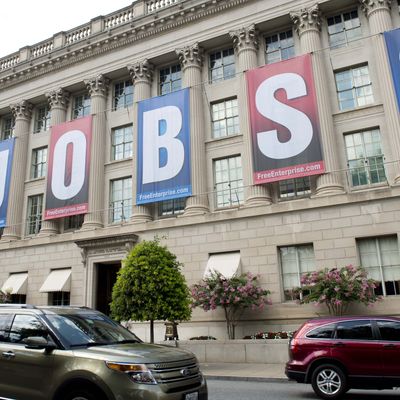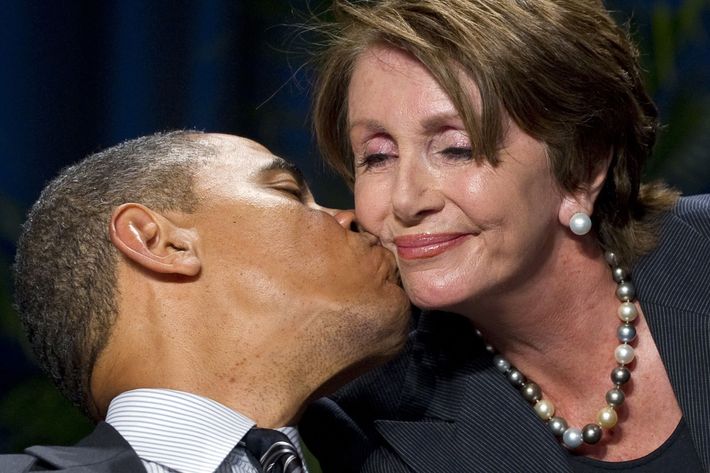
The business lobby’s very public exasperation with House Republicans has given Democrats in Congress an idea: They can lure the business lobby to switch sides. The basic underlying calculation makes a certain degree of sense. The most recent controversies in Congress have all entailed Republicans defying corporate America’s preferences — by killing immigration reform, threatening the Export-Import Bank, and blocking any long-term solution to highway funding. “It is a trifecta reminder of how the tea party has taken over the Republican Congress,” says Democrat Steve Israel, who, reports The Wall Street Journal, has “stepped up his courtship of business donors.” Likewise, Senator Charles Schumer pleads, “From the Export-Import bank to tax extenders to immigration reform, Democrats and business are on the same side on a range of issues. The Tea Party has dragged the Republican Party so far to the right that business is now closer to mainstream Democrats than Republicans.” But the Democratic courtship of the business lobby has not worked, and it isn’t going to.
It is certainly true that the business lobby has some bitter recriminations against the GOP. The House Republican takeover in the 2010 election, to which the business lobby lent its overwhelming support, went off the rails almost immediately. In their mania for confrontation, Republicans kept shooting at President Obama and hitting the economy where their business allies live. They have repeatedly rattled markets by threatening default, and then, as the price of avoiding full calamity, received budget sequestration cuts that have cost around a million jobs. The costly government shutdown likewise impaired the federal government’s basic functioning.
The most frequent talking point used by businesses to denounce Obama’s agenda — that it was introducing “uncertainty” — turned out to be a demonstrably false description of Obama’s agenda but a plausibly true description of the House Republican one. The erratic pattern of angry backbench rebellion, failed votes, and John Boehner giving up in tears has turned even the normal, status quo gridlock business thought that it would get into an unattainable aspiration.
Yet several things stand between the Democrats and the dream of prying business, and its hundreds of billions of dollars in contributions, from the GOP. One is the inertia of established loyalties. During their 12-year reign from 1995 through 2007, House Republicans carried out what they called the “K Street Project” to cleanse the ranks of the business lobby of former Democrats and fill the slots with GOP loyalists. The mostly Republican loyalists who direct K Street’s political orientation are not eager to sever ties with the Party that nurtured them.
Another barrier is the daunting scale of the task. Flipping business support might help Democrats in the Senate hold on to a few vulnerable seats. But the prospect of making Mitch McConnell the Majority Leader does not exactly strike fear into K Street. Senate Republicans, for the most part, are not their problem. The House Republicans are the problem. And the House map lends Republicans such entrenched control that flipping it is a near-hopeless proposition. Why would business throw itself behind a long-shot campaign to turn the House blue, when the overwhelmingly likely result of such an effort would be to anger the tea party without deposing it? It would be like shooting the king as he speeds past you in his armor-plated limousine.
And even if it could flip the House, the main trouble is that the business lobby wouldn’t want to. This is the main obstacle missing in all the talk about friction between Chamber of Commerce Republicans and tea party Republicans: They’re all Republicans. Just stroll through the U.S. Chamber’s website. They hate Obamacare, the Dodd-Frank law, power-plant regulations, the minimum wage, unions — pretty much the entire Democratic agenda.

Now, as it currently stands, the Democratic agenda (except EPA regulations) is presently dead. So the current context has instead created a series of “should Republicans blow stuff up because they hate Obama” issues where the Chamber is indeed aligned with the Democrats. But if the House flipped, then there would be a new context where Democrats could suddenly pass Democratic bills again. And that would be worse for the business lobby than the status quo.
If you had a Republican president to veto these bills, then the business lobby wouldn’t fear a Democratic House. But if you had a Republican president, House Republicans would be passing Republican laws instead of blowing things up. So, either way, flipping the House fails to solve business’s troubles.
Here are the four possible arrangements of government control, ranked from top to bottom, from the standpoint of the business lobby:
1. All-Republican government. Business can enjoy a flurry of laws cutting taxes for owners of capital and eliminating regulations to protect labor and the environment.
2. Republican president, Democratic Congress. Benign gridlock with no sabotage — the Democratic Congress was not willing to block a stimulus in 2008 even though the resulting economic damage would have helped them.
3. Democratic president, Republican Congress. Malign gridlock with regular crises and mayhem.
4. Democratic president, Democratic Congress. Passage of legislation business mostly or entirely opposes.
If the business lobby could flip the House from red to blue while also flipping the White House from blue to red, it would do that in a heartbeat. But that option isn’t on the table. The choice is whether to help Democrats gain power in Congress. Business has lots to lose from doing that, and little to gain.






























